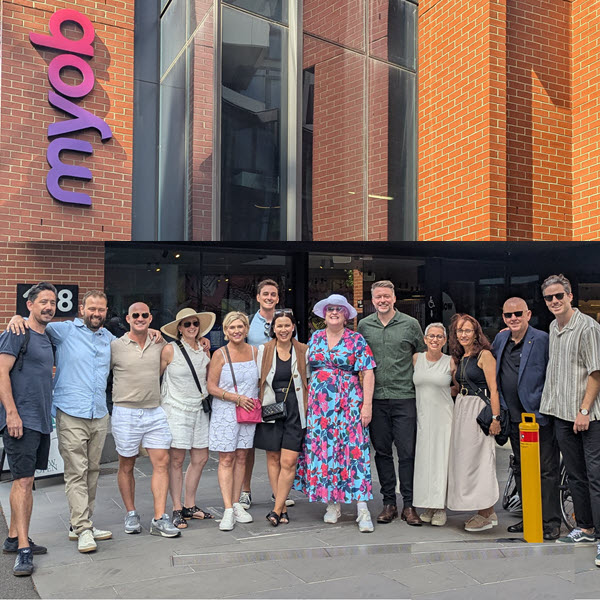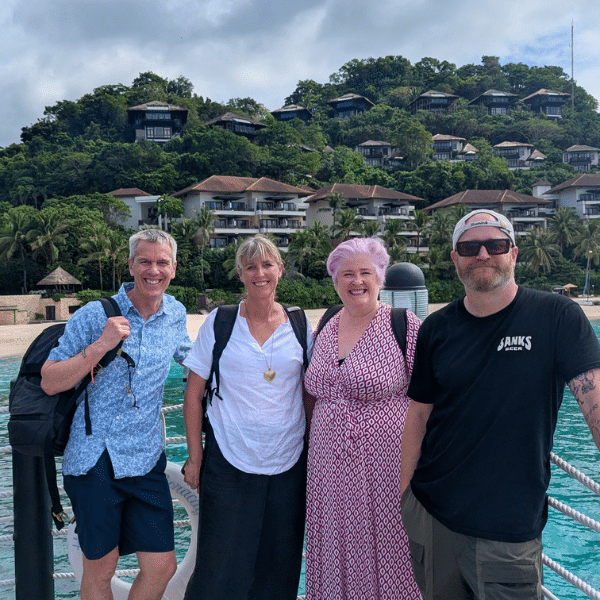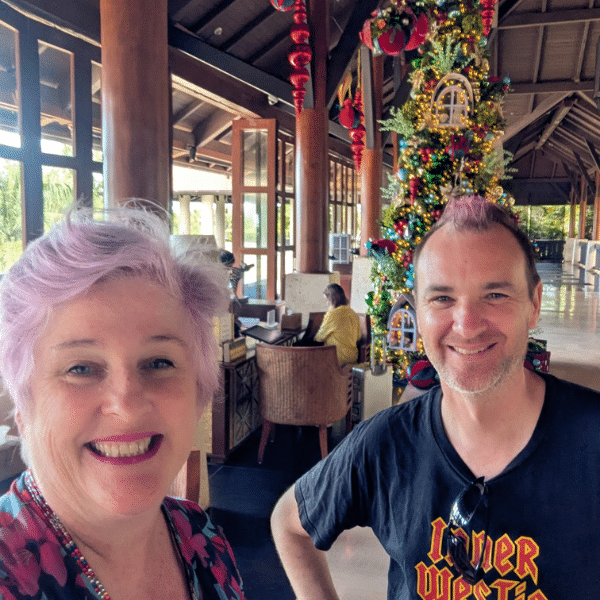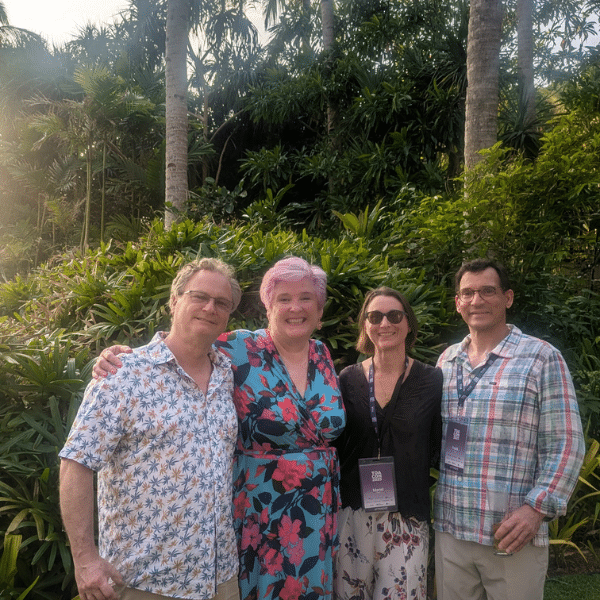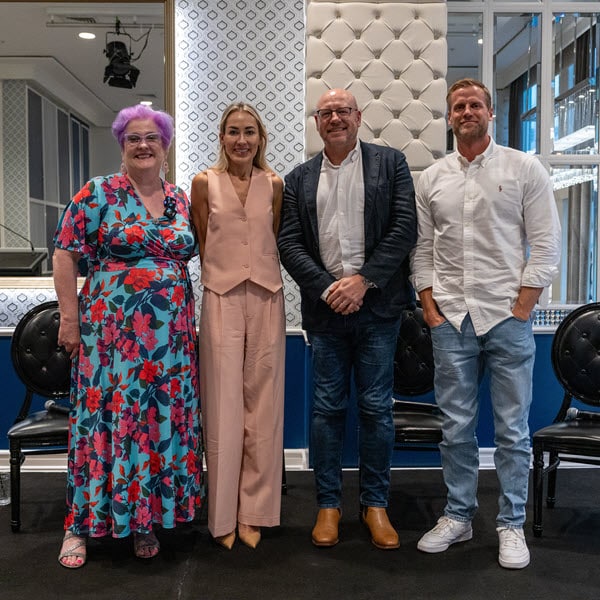What I would say to people is, first of all, you should be beginning the (AI) journey now.
Our philosophy continues to be human in the loop, and that is, I don’t think we’re ready for a self-driving ERP system yet. We still want to continue a driving analogy. We still want a human with their hands on the wheel.
– Brian Chess, SVP Technology and AI, of Oracle NetSuite.
Today’s episode is the final part of a series of six interviews recorded at the Oracle CloudWorld and SuiteWorld conferences, which were held in Las Vegas in September 2024. I encourage you to subscribe and add them all to your playlist.
In this episode, I speak with Brian Chess, SVP Technology and AI, at Oracle NetSuite.
Brian oversees the development and operations of NetSuite’s technology stack, platform, and AI-driven functionality. He holds a Ph.D. in Computer Engineering as well as more than a dozen patents related to integrated circuit design, web-based applications, and computer security.
We discuss:
- The concept of “AI built in, not bolted on,” referring to the deep integration of AI with NetSuite.
- The philosophy of “human in the loop,” emphasising the importance of human oversight and trust in AI systems.
- Brian believes the best AI feature will likely be created by NetSuite customers, leveraging the platform’s openness.
Got a packed schedule? Now you can get your CPE credits while you’re on the go! Tune in to my podcast on Earmark and earn NASBA-approved CPE or IRS-approved CE—just by listening. It’s that simple. Head to my Earmark CPE channel, register and launch the course.
Don’t miss the details at the end of this blog to learn more about Earmark CPE. Now, let’s dive into this episode! 🎧
Transcript / Quote
Scroll down for a full transcript
This transcript has been generated and transcribed by AI
Can you share a little bit about what your role involves with our listeners?
Brian:
Oh, well, you know, it’s more or less like it says on the tin. So technology and AI. In our world, that technology portion covers a lot of the foundation of NetSuite, including how we deploy NetSuite into the cloud. That’s the OCI, and then everything we need to do in order to keep it secure and reliable and performance. And then on top of that is all the NetSuite Foundation, which includes the NetSuite platform so how people customise NetSuite to meet their needs, how they connect to partners and others. Then on top of that, and most recently, artificial intelligence, which is quite the popular topic these days, something we’ve been doing for quite a while, but as with a lot of the world, we’ve really turned up the effort and the energy recently.
I’ve looked at your career history, and I’d like to ask, can you remember a time before AI?
Brian:
Well, you know, I think AI has been playing a part in all of our lives for a while now, but for a long time it was maybe a little bit hidden. So some AI was happening. The example I tried to come up with the other day where I think most people encountered AI first was probably in spam filters. And maybe you might have noticed that spam filters got better around the turn of the century, or you might not have noticed that spam filters got better around the turn of the spam got a lot better too. So that has been a constant arms race, but once, once we moved over to Bayesian inference for spam filters, things actually got better for at least for a while. So AI has been around for a long time, but it wasn’t until very recently that we started talking to it, and of course, that’s captured a lot of people’s imaginations with generative AI, both for images and for text and we’ve got a lot more we can do with these new capabilities.
When you refer to talking to AI, are you talking about chatbots?
Brian:
The large language models are the things that have have really got people thinking about, wow, what can we do with this? And the answer is, there’s quite a bit we can do it.
Heather:
Yeah, yeah. It’s quite phenomenal. And I just thought from your history, you would have been touching on it many, many times, and all of a sudden, boom, it’s the word. It’s the buzzword everyone’s is talking about.
Brian:
Way back in graduate school. So this was probably, oh, the middle of the 90s. I took a machine learning class from a guy named David Haussler, and he’s saying, I’m looking into this, this problem that’s out there. And I think maybe this class is relevant to it. It’s about protein folding, and that the work that he was and I thought, yeah, I don’t think I’m really interested in that. And I kind of went on about my business, and then that turned into the Human Genome Project. And so another really early application of AI.
Heather:
Wow. Amazing, absolutely amazing. So circle back. We’re here at SuiteWorld.
What are the key AI initiatives that NetSuite is currently focusing on? And What AI features do you think NetSuite customers are most excited about?
Brian:
So we got started with our first generative AI feature last year at SuiteWorld, Text Enhance, and we’ve done a lot this year to build on that. And so we’ve got a number of AI things that were shown off on the show floor, including Text Enhance. But then the follow on to Text Enhance is Prompt Studio, where, instead of just using the prompts that we’ve built into Text Enhance, you can add your own. And then if that is interesting, but maybe not customisable enough, we’ve introduced the ability to add your own AI features using the SuiteScript APIs. So now you can make your own calls to large language models. And if that sounds like it’s pretty interesting, but it’s too difficult to do, well, now there’s Oracle Code Assist, where you can get help writing SuiteScript using AI. And so I think the best AI feature that is going to come out of this SuiteWorld is going to be one that’s built by one of our customers, because now we’ve opened up the platform so people can solve their own problems the way they want to solve them, using AI powered by NetSuite.
Heather:
Wow, that’s wonderful. That’s so open to thinking that it’s going to be the customers who are going to do it.
Brian:
I’m really excited.
Heather:
Yeah, yeah, yeah, because they see the necessity and it will be something that you would never have seen coming.
Brian:
That’s the power of having 40,000 customers is there are going to be a lot of imaginations at work.
Heather:
Fabulous. I love that. I love that. So you’ve been quoted saying, ‘AI needs to be built in, not bolted on’.
Can you explain what you mean by this for our listeners and how you achieve it?
Brian:
So the generative AI revolution came around with these pre-trained models that had absorbed just massive amounts of text from the internet. And that’s what allows an LLM to write a bad piece of poetry anytime you want. And that’s a pretty attractive, captivating kind of thing to do, but those language models don’t come pre-trained with any knowledge about your business or really about the details of NetSuite either. While it’s really tempting maybe to sort of do a superficial kind of integration of that kind of technology, I don’t think there’d be a lot of benefit to our users from that. So instead, maybe I’ll reference something else that we introduced at this SuiteWorld, and that’s Suite Analytics Assistant. And with Suite Analytics Assistant, you can ask your question, and then, instead of just giving you an answer that AI knows how to query NetSuite in order to get Suite Analytics to answer your question, and so what you end up with is a report or a chart or a graph inside NetSuite that you can customise further if you want to, or you can ask the AI to customise further, but it’s a deep integration, because that AI understands NetSuite. So that’s the kind of thing that we mean when we say built in, not bolted on.
Heather:
Okay, absolutely. And in terms of that one that you were explaining, the Suite Analytics Assistant, can you ask it? We saw some demonstrations, and they were asked about sort of five criteria across it.
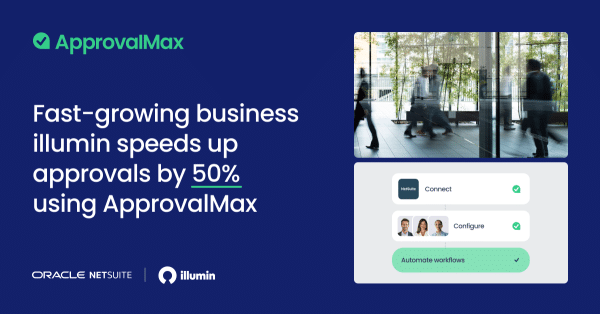
Fast-growing business illumin speeds up approvals by 50%
Can you ask quite complex questions, or do you have to build up to pull out anything too complicated?
Brian:
I think that over time, we’re going to see people. We’re going to see the ability to ask more and more complex questions. I think right now, one issue that a lot of systems have, NetSuite included, is they are so rich. There’s so much in there. Even asking a simple question can be complicated, because where do you go? So you can ask some pretty sophisticated things right now, and it knows you know what last month is and what the next quarter is. It knows a fair amount about how to understand your language. It also knows a fair amount about how to find things in NetSuite. But I think that we are still much closer to the beginning of the AI revolution than to the end. So what we can do today is pretty impressive. When you look back at it, 10 years from now, we’ll say, oh, we were just getting started.
Heather:
Wow. Okay, that’s throw me. We’re at the beginning.
How long do you feel the end of the ‘beginning of AI revolution’ is away?
Brian:
Oh, boy.
Heather:
Are we talking like a 10 year or a 20 year period or?
Brian:
I mean, I take when I’m asking questions like that, I just look to history to try and give me some sort of a guide.
Heather:
Yeah.
Brian:
So it was about 50 years between when Thomas Edison invented his light bulb, 50 years from then before half of the US had electricity in the home. So of course, things are getting faster and faster, but we sort of think of the light bulb, as when electricity arrived, but it actually took a good long time before we started to take advantage of that kind of innovation. And so I hope it’s not 50 years before we’ve gotten a whole lot out of AI, but I think that it’s going to take time for us to really fully absorb and make use of even the kinds of things that AI can do today.
Heather:
Yeah, no, it’s mind blowing.
How is AI being used to personalise the experience within NetSuite? How do we ensure humans remain central in these AI-driven processes?
Brian:
As far as personalisation goes, we’ve been talking about a lot of features that are related to generative AI, but we’ve got a whole other set of features, and I’ll name one that we announced here, and that’s Financial Exception Manegement. That is a model that is built per company. So it’s built to identify exceptions based only on that company’s data and no other company’s data. And so it is specific to the company, not necessarily to the individual, of course, here, but a lot of times we’re looking at that at that kind of company level. Okay, you had a second part to your question.

Second part, how do we ensure the humans remain central?
Brian:
So our philosophy continues to be human in the loop, and that is, I don’t think we’re ready for a self driving ERP system, yet. We still want to continue a driving analogy. We still want a human with our hands on the wheel, and that’s important in two respects. First of all, the AI is continuing to grow in sophistication, and so we want to make sure that it’s up to the job. And then also, we know it’s very, very important for our users to trust the system, and so we don’t want to take control away from them and have them feel like they’ve lost their agency. So, still, the AI is making recommendations, but we expect humans to review those and say yes or no,.
Heather:
Thank you for that.
What advice would you give to businesses looking to leverage AI in their operations?
Brian:
Well, I would say two things. We’ve already talked about how there’s a lot more AI to come. What I would say to people is, first of all, you should be beginning the journey now. If you haven’t already, you should be beginning the journey. I think there are some other fairly recent innovations, like blockchain, cryptocurrency Metaverse, where, you know, if you didn’t jump on the wagon, probably that’s okay.
Heather:
Yes! See that everyone,
Brian:
AI, is a little different. This is going somewhere, and you and your business should be involved. At the same time, you should expect that what you’re doing achieves real business value, and so you should look for problems. I think financial exception management is a very nice place to start, where you say, here’s a problem, which is, every so often, we’ve got a transaction, it’s got a problem with it, and we need to find those and fix them. It’s incredibly important for a period close. In fact, it’s one of the main things that introduces variability into a period close. And so if you can identify those problems earlier, there’s significant business value there. Okay, maybe that’s a good place to start. Now with NetSuite, you can also do much more sophisticated stuff, develop your own models. That’s not where I would begin. I would begin with something that was pretty well assembled for you, see some value there, and then look at where to invest next.
Heather:
Absolutely. Thank you for that.
Are you able to share any success stories of customers that you know of who are successfully using AI in their businesses?
Brian:
Oh boy, we saw here at SuiteWorld today. I mean, Evan even had a customer on stage talking about how NetSuite Bill Capture pretty much freed up so much time that somebody was able to move departments. So I think it’s a phenomenal success story. I’ll tell you about one that we had been a little more shy about, and that is our own use of AI. So we use Text Enhance in NetSuite customer support, and what we see is that our customers like it, and our support reps like it. And so it’s been a real win-win.
Heather:
I imagine you can get some really interesting trends out of that as well, in terms of, if you’re monitoring everything, where people are getting confused about things and then tackle and deal with them.
Brian:
We have. We looked at that data. We thought that maybe a good first metric would be that conversations would be shorter. Because you would need less back and forth if explanations were more clear. We found out that’s not always the case. Sometimes actually, we’ve given the support reps, the confidence to extend a conversation, to explain things more fully, and that’s fantastic too.
Heather:
Yeah, absolutely.
Can you briefly talk about how Oracle will keep the AI platform costs lower in the long term due to your relationship with Cohere, an enterprise AI platform?
Brian:
Well, so Cohere is the large language model that we started with Text Enhance last year. We now support Cohere. We also allow people through those SuiteScript APIs to access other LLMs if they want to.
Heather:
Okay.
Brian:
I think that’s a powerful capability, but as far as cost goes, the fantastic benefit to NetSuite in particular is the fact that we’re built on OCI. That means that we’re not having to go and find GP source, GPUs just for NetSuite. We’re actually able to get them through OCI that, of course, is serving a much larger customer base. So that’s a real advantage to us when it comes to making sure we have the resources that we need, where we need them, and also at a good price, because we’re buying in very large volumes.
Heather:
Absolutely, absolutely. It does seem to be a lot of cost. Talk about the cost of AI and the ongoing cost, but interestingly, it does seem to be coming down. I’m not an expert on it, but anecdotally, people seem to be suggesting it’s coming down rather than going up.
Brian:
I mean, I’ll name sort of two halves for that. There’s training these large language models where people are still estimating that you can spend $100 million training an LLM. Happily, we’re not doing that. We’re using other LLMs from other sources. So that training cost doesn’t apply to us as much. And then there’s the inference costs. So that’s when you actually use the model. And costs for inference have come down by a factor of something like five in the last year due to a combination of faster GPUs and better algorithms. And there’s no reason to think that that trend will abate. So I think costs will keep coming down there and sort of reinforces the decision that we made a year ago, which is that we don’t think that AI should be an upcharge. We think that it should be built in to the price of the system.
Heather:
Yes, absolutely.
How do you envision that AI is going to transform the systems over the next five years?
Brian:
I think that we’re going to see a lot more purpose built systems, where we’re going to see AI applied in a lot more places. You already see a couple of places in the news where it’s very popular. Software Development is one of them. Customer Support is another that’s that’s going to broaden, though, into into more and more domains, and more and more people specialising it to do what they want it to do. So that’s those are the couple of things that I see coming. You’ve heard a lot about things like rag retrieval, augmented generation. I think that’s going to be a big one where you can attach a database to that LLM, as well as lots more tool use. I talked a little bit about the use of NetSuite as a tool for AI. I think there’ll be a lot more tools that enter that toolkit too.
Heather:
Yes, absolutely. So you’re possibly one of the most knowledgeable people here at SuiteWorld 2024 with all the 18,000 people here. So this may not be an easy question for you to answer. What’s something that you’ve learned over the last few days? Takeaway from the set from the last few days of SuiteWorld 2024. I think everyone’s got lots of takeaways from you.
What’s one key takeaway you’ve learned from attending SuiteWorld 2024?
Brian:
Well, you know, I’ve been learning, learning things here. One of the things I’ve been learning, well, the one of the things I wasn’t sure about, because we thought there was a lot of enthusiasm for AI last year. I wasn’t really sure what was going to happen this year. We’re going to come back and say, well, people are kind of over it, because I think if you just reading the headlines, people are starting to see that there are limitations. It doesn’t solve all problems. So I wasn’t sure, like, were we going to find a more reluctant audience this year. And what we found is people are just like, that’s great. Now give us more. So maybe two things I’ve heard more and faster. So that’s one of them. And of course, this year, you know, we’re sitting here and just across the street is CloudWorld happening. But I’ve been very, very busy at SuiteWorld, and I’ve had lots of people sitting in your seat coming back and bringing me news from CloudWorld and telling me, Well, here’s what Larry Ellison just said. I’m like, Oh, that’s very interesting. I’m afraid I was busy here. I’ve been learning more about where Oracle is heading by attending SuiteWorld.
Heather:
Fantastic.
On a personal note, do you have a smart home, or is it rustic and simplistic?
Brian:
Well, I think this might be in the eye of the beholder. You know what qualifies? Because I go home and I’m at home and I’m very comfortable.
Heather:
Do you clap your hands and the lights go on?
Brian:
There’s no clapping my hands. How do you count how smart your home is? So I’ll give you sort of one metric that I surprised a friend with the other day. I didn’t think it was so impressive, but he said, how much stuff is on your home WiFi network? About 40 things on my Wi Fi network. And he was like, whoa, okay, there’s a lot going on in your house. Okay.
Heather:
Someone compare that metric. That’s something I need to ask about. I think I maybe have a dozen, but that’s cool. Thank you so much for joining us on the Accounting Apps podcast. It’s been really delightful to speak with you and learn more about what’s happening in the Oracle, NetSuite world.
Thank you for your time, Brian; how can our listeners contact you?
Brian:
Oh, follow me on LinkedIn. I think is a great way. With the advent of AI, have become a LinkedIn cheerleader for NetSuite, and I’m having a great time doing it. I’d love any feedback, anyone cares to share.
Heather:
Fantastic. Thank you so much.
Brian:
Thank you, Heather.
Earmark CPE is registered with the National Association of State Boards of Accountancy (NASBA) as a sponsor of continuing professional education on the National Registry of CPE Sponsors. State boards of accountancy have final authority on the acceptance of individual courses for CPE credit. Complaints regarding registered sponsors may be submitted to the National Registry of CPE Sponsors through its website: www.NASBARegistry.org.

